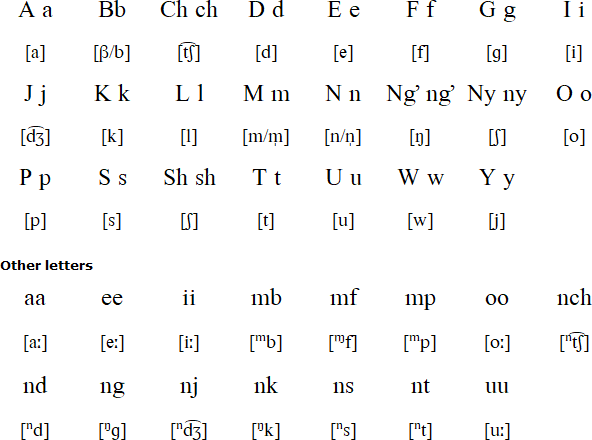Aushi is a Bantu language spoken by about 100,000 people in Zambia and the Democratic Republic of the Congo. It is spoken mainly in Mansa District in the south of Luapula Province in the northeast of Zambia, and in Haut-Katanga Province in the southeast of the DRC. It is spoken mainly as a second language in the DRC.
Aushi is also known as Ushi, and Aushi speakers call their language Ikyaushi. It is closely related to Bemba, and some scholars classify it as a dialect of Bemba, although Aushi speakers insist that it is a separate language. It is written with the Latin script.

Download an alphabet chart for Aushi (Excel)
Details of the Aushi alphabet provided by Wolfram Siegel (PDF)
b is pronounced [β] at the beginning of words and between vowels. Elsewhere it is pronounced [b].
Patile akantu abantu baikele mu kwalo, mu kwalo baikele mwali imfumu Bankalamu. Balitekele umushi uukalamba nganshi. Nomba Bankalamu balyebele ukutila nkofwaya umuntu uwakusalilako ikilundu. Ikilundu? Kalulu amfwefyo aeba ukweba ati ikilundu fweebo twaya mukusala kilundu.
Once upon a time, people had lived in the chiefdom of the Chief Lion. They made a village which was quite large. Now Lion said, "I want someone who can make me an ikilundu [cloth from tree bark]". Ikilundu? Rabbit head [and] said, "Yes, an ikilundu, we are going to make an ikilundu.
Source: A Descriptive Grammar of Ikyaushi. 2020.
Information about Aushi
https://en.wikipedia.org/wiki/Aushi_language
https://fr.wikipedia.org/wiki/Aushi_(langue)
http://www.language-archives.org/language/auh
https://library.search.tulane.edu/discovery/fulldisplay/alma9945513062206326/01TUL_INST:Tulane
Aka, Aushi, Bafaw-Balong, Bangi, Bangubangu, Basaa, Bemba, Bembe, Bena, Benga, Bhaca, Bila, Bube, Budu, Bujeba, Bukusu, Bulu, Bushong, Central Kilimanjaro, Central Teke, Chichewa, Chokwe, Chuwabu, Comorian, Dciriku, Digo, Duala, Eton, Ewondo, Fang, Fuliiru, Ganda/Luganda, Gogo, Gusii, Gwere, Gyele, Haya, Hehe, Herero, Ibinda, Idaxo-Isuxa-Tiriki, Ikizu, Ikoma, Jita, Kabwa, Kako, Kamba, Kanyok, Kiga, Kikuyu, Kimbundu, Kinyarwanda, Kirundi, Kisi, Kobo, Kogo, Komo, Kongo, Konjo, Koti, Kukuya, Kunda, Kuria, Kwambi, Kwasio, Lambya, Lengola, Lingala, Loma, Lozi, Luba-Katanga, Luchazi, Lunda, Luvale, Luyana, Makaa, Makonde, Makhuwa, Mandekan, Maore, Masaaba, Mbama, Mbere, Mbosi, Mbukushu, Mbunda, Mbuun, Mende, Mongo, Mpiemo, Mushungulu, Mwani, Myene, Nambya, Nande, Ngoni, Ngwii, Njebi, Nkore, North Teke, Northern Ndebele (South Africa), Northern Ndebele (Zimbabwe), Northern Sotho, Nyamwezi, Nyakyusa, Nyemba, Nyole, Nyoro, Nyungwe, Nzadi, Oroko, OshiWambo, Pagibete, Punu, Ronga, Safwa, Seki, Sena, Sengele, Shona, Soga, Songe, Southern Ndebele, Southern Sotho, Suba, Sukuma, Swahili, Swati, Taita, Talinga, Tanga, Tembo, Tetela, Tonga, Tooro, Tshiluba, Tsonga, Tswa, Tswana, Tumbuka, Umbundu, Venda, Vili, Vwanji, West Teke, Xhosa, Yakam, Yansi, Yao, Yasa, Yeyi, Zigula, Zinza, Zulu
Languages written with the Latin alphabet
Page created: 15.07.25. Last modified: 15.07.25
[top]
You can support this site by Buying Me A Coffee, and if you like what you see on this page, you can use the buttons below to share it with people you know.

If you like this site and find it useful, you can support it by making a donation via PayPal or Patreon, or by contributing in other ways. Omniglot is how I make my living.
Note: all links on this site to Amazon.com, Amazon.co.uk
and Amazon.fr
are affiliate links. This means I earn a commission if you click on any of them and buy something. So by clicking on these links you can help to support this site.
[top]